The year 2024 marks the 350th anniversary of the passing of John Milton (1608–1674), one of England’s greatest poets. Commemorative events have been held worldwide to honor his legacy. On the morning of December 7, the 49th lecture of the Center for Medieval and Renaissance Studies of School (CMRS) at the School of International Studies in Zhejiang University was conducted online via Tecent Meeting. Professor Lee Morrissey from Clemson University and Professor HAO Tianhu from Zhejiang University engaged in a stimulating two-hour academic dialogue themed “Milton and Modernity.” The event was supported by “The Collection, Translation, and Research of Milton’s Works”, a major project of National Social Science Fund of China, and attracted over 60 attendees, including faculty and students from institutions such as the University of Cambridge, Peking University, and Fudan University. This dialogue was moderated by Professor SHEN Hong from Zhejiang University.
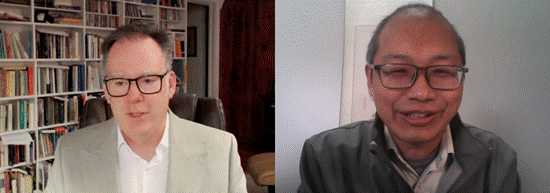
Professor Lee Morrissey and Professor HAO Tianhu
Professor SHEN Hong initiated the dialogue by introducing the two guest speakers. Professor Lee Morrissey, a Ph.D from Columbia University, and a Distinguished Alumni Professor at Clemson University, has been teaching in the Department of English for nearly 30 years. He was also the founding director of the Clemson Humanities Center. His expertise lies in English literature from the early 17th to late 18th centuries, with notable publications such as Milton’s Late Poems: Forms of Modernity (Cambridge University Press, 2022) and Milton’s Ireland: Royalism, Republicanism, and the Question of Pluralism (2024), among others. Professor HAO Tianhu, also a Ph.D. from Columbia University, is a Distinguished Professor under China’s national high-level talent program and a Qiushi Distinguished Professor at Zhejiang University. He is currently director of the Center for Medieval and Renaissance Studies and a Harvard-Yenching Visiting Scholar (2023–24). Professor HAO has published over 70 papers in Chinese, English, and Russian, as well as four monographs, including the award-winning Milton in China (2020). His most recent English monograph, Commonplace Reading and Writing in Early Modern England and Beyond, was published by Routledge in 2024.
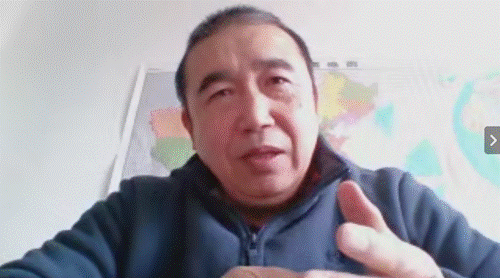
Professor SHEN Hong moderating the academic dialogue
The conversation opened with Professor HAO raising the concept of the “modern paradox” from Morrissey’s 2022 work. Professor Morrissey, referencing William Wordsworth’s famous line, “Milton! thou shouldst be living at this hour,” argued that Milton remains relevant today due to his ancitipation of numerous facets of modernity. He proposed that “modernity is ancient,” a notion Milton frequently emphasizes in his later poems, including Paradise Lost, Paradise Regained, and Samson Agonistes. Morrissey also highlighted that reactions to modernity often follow recurring patterns. Professor HAO agreed and steered the discussion toward the “forms of modernity.” Professor Morrissey observed that the original 1667 edition of Paradise Lost consisted of ten books, while the 1674 edition was restructured into twelve books. He explained that this transformation in epic form mirrors a key feature of modernity. Additionally, from a psychological perspective, Milton’s emphasis on the individuality and inner lives of figures such as God, Adam, and Eve illustrate a significant evolution in the epic tradition. Professor HAO then expanded on this point by citing John Carey’s analysis of Satan’s tripartite identity, as archangel, prince of devils, and tempter of humanity in Eden, arguing that Satan’s character depth aligns with Professor Morrissey’s interpretation.
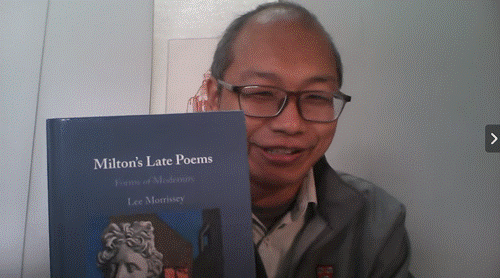
Professor HAO Tianhu Introducing Professor Morrissey’s Works
The two scholars then directed their focus to Milton’s epic Paradise Lost. Discussing its relationship with the novel as a genre, Professor Morrissey argued that while the novel is a distinctly modern form, Paradise Lost, with its focus on fictionality, is deeply connected to it. He further illustrated that many plot elements in subsequent British novels can be traced back to Paradise Lost. Taking the companionship between Adam and Eve as a case in point, Professor Morrissey observed that marriage plots in the works of 19th-century novelist Jane Austen were rooted in this foundational relationship. Besides, Morrissey drew a parallel between Paradise Lost and Mikhail Bakhtin’s theory of polyphony, highlighting how the poem presents the voices of God, angels, Satan, Adam, and Eve. Professor HAO added that Milton’s imaginative retelling of the biblical narrative of the Fall, combined with the poetic beauty of his verse, enhances the work’s artistic appeal, making it resonate with a broader audience.
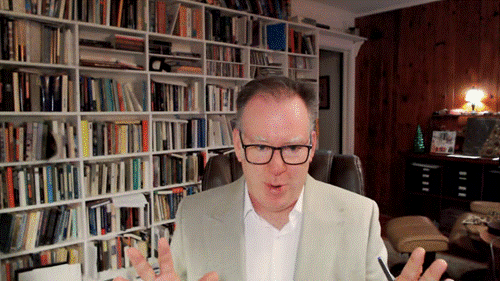
Professor Morrissey during the academic dialogue
Then, the two scholars delved into Paradise Lost through the lens of reader-response criticism, focusing on the roles of its key characters. Professor Morrissey observed that readers often place disproportionate attention on Satan while much of Paradise Lostrevolves around the relationship between Adam and Eve. He pointed out that in the English-speaking world, there is a long-standing tradition of depicting Satan as a protagonist, hero, revolutionary, or a figure of boundless energy. Professor HAO Tianhu added that for a significant period, Satan was similarly portrayed as a revolutionary figure in China. However, scholars such as Stanley Fish have corrected this tendency, redirecting attention from Satan back to God, which HAO suggested is likely closer to Milton’s original intention. The conversation grew even more engaging when the two scholars turned their attention to Eve. Professor HAO argued that Eve’s defiance stems from her longing for greater equality and freedom. He explained that this reflects her autonomy as a character and represents a necessary step in her personal growth. Professor Morrissey offered a fresh perspective, proposing that Paradise Lostdepicts God conducting an ongoing experiment. According to Morrissey, God does not wish for a submissive universe; instead, He observes humanity making decisions, even when those decisions lead to negative outcomes. Their analysis extended beyond Eve to other female characters in Milton’s works, such as Dalila in Samson Agonistes. Finally, the two scholars explored the theme of “terror” in Paradise Lost, Paradise Regained, and Samson Agonistes. Professor Morrissey argued that each poem addresses terror and uncertainty in distinct ways. Professor Hao, meanwhile, highlighted a common thread across the three works: the protagonists ultimately reaffirm or strengthen their faith in God.
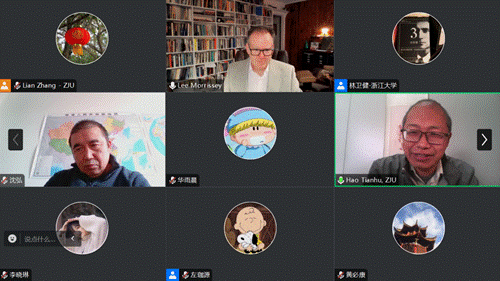
Academic Dialogue LIVE
In the concluding session, attendees raised a variety of questions, such as the paradox of knowledge and wisdom in Paradise Lost, gender roles and labor division, depictions of war, and the relationships between fiction and reality. They also discussed Milton’s engagement with scientific concepts. Professors Morrissey and HAO provided thoughtful and detailed responses, illustrating their points with examples from a broad spectrum of sources. Professor HUANG Bikang from Peking University and graduate students from School of International Studies of Zhejiang University contributed to the discussion, which was summarized by moderator SHEN Hong. Professor SHEN commended the dialogue for its vibrancy, insightfulness, and rich content. The event concluded in a warm and enthusiastic atmosphere, with many attendees expressing their appreciation for the depth of the conversation.
Center for Medieval and Renaissance Studies of School (CMRS)
Texts: ZUO Jiayuan, ZHANG Lian Photos: ZUO Jiayuan
December 8, 2024
Translated by SUN Fangrui
Proofread by XU Xueying



